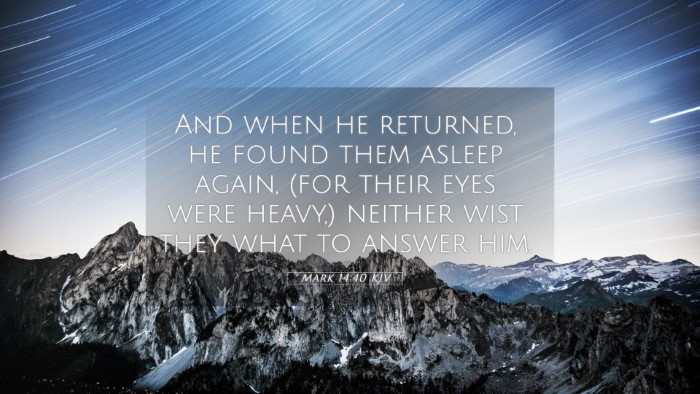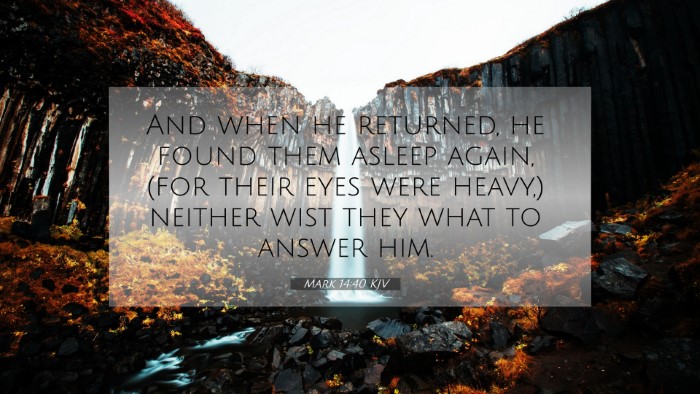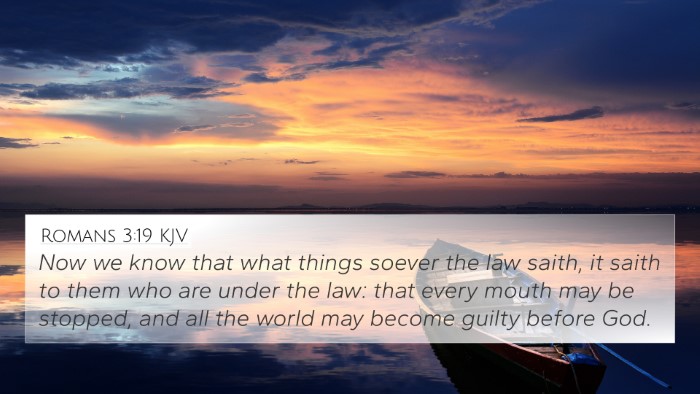Understanding Mark 14:40
Mark 14:40 captures a poignant moment in the New Testament, where Jesus returns to find His disciples sleeping during a time of great sorrow and impending betrayal. This verse reads:
"And when he returned, he found them asleep again, for their eyes were heavy. So they did not know what to answer him."
Verse Meaning and Commentary Insights
This verse, located in the vital narrative of Jesus' Passion, invites contemplation on human weakness and divine expectations. Key insights from public domain commentaries illuminate the depth of its message:
Matthew Henry's Commentary
Henry emphasizes the contrast between the disciples' physical weakness and the spiritual urgency of the moment. In his analysis, he notes:
- Spiritual Vigilance: The disciples' inability to stay awake signifies a lack of readiness for the trials to come.
- The Weight of Sorrow: Their heavy eyes reflect not just exhaustion but a deeper emotional burden, showing how humanity often falters in critical moments.
Albert Barnes' Notes
Barnes elaborates on the implications of their sleep, regarding it as a metaphor for spiritual lethargy:
- Human Frailty: Barnes points out that the disciples' sleep exemplifies the common struggle against spiritual weariness.
- Obedience and Accountability: The question posed by Jesus highlights the need for his followers to embrace accountability in their spiritual journey.
Adam Clarke's Commentary
Clarke’s exposition brings forth the notion of prayer and preparedness:
- Call to Prayer: He stresses that Jesus’ request for vigilance mirrors the essential practice of prayer during times of trial.
- Understanding of Divine Will: Clarke interprets this moment as a critical lesson in understanding the importance of aligning oneself with God’s will, especially during difficult times.
Cross References
To deepen the understanding of Mark 14:40, here are several relevant Bible cross-references that enrich this passage and showcase its thematic connections within scripture:
- Matthew 26:43-45: Similar account of the disciples sleeping while Jesus prays in Gethsemane.
- Luke 22:45: Details the same event, emphasizing Jesus’ sorrow as He finds them asleep.
- 1 Thessalonians 5:6: A call to be alert and sober in spiritual diligence.
- Mark 13:33: The instructive charge to watch and pray as the time of the Lord’s return is unknown.
- Romans 13:11: Reminder of the urgency to wake from sleep because salvation is nearer than before.
- Matthew 26:40: Shares additional insights into the disciples’ failed watchfulness.
- Hebrews 12:1: Encourages believers to lay aside every weight and run with endurance, akin to the necessary vigilance Jesus sought from His followers.
Thematic Connections
This verse serves as a rich ground for thematic connections among biblical texts. The idea of spiritual alertness appears recurrently throughout scriptures, making it a pivotal study area:
1. Vigilance in Prayer
This theme resonates through the gospels, where prayer and vigilance during trials are repeatedly stressed. Notable verses include:
- Luke 21:36: The emphasis on praying for strength to escape tribulations.
- James 5:16: The power of effective prayer in righteous living.
2. The Human Condition
Mark 14:40 exemplifies the biblical narrative's focus on human frailty and the need for divine strength.
- Psalm 103:14: God remembers our frame, knowing we are dust, which relates to the disciples' weakness.
- 2 Corinthians 12:9: God's strength is made perfect in weakness, illustrating divine aid in human struggles.
3. Spiritual Readiness
The need for readiness is a recurring motif that invites personal reflection.
- Matthew 25:1-13: The parable of the ten virgins continues this theme of being prepared for the coming of the Lord.
- 2 Peter 3:14: Calls believers to be diligent in being found in peace, highlighting a need for consistent spiritual vigilance.
Conclusion
Mark 14:40 serves as a vital reminder of the importance of spiritual vigilance and the pitfalls of human frailty, calling believers to a deeper understanding of their relationship with God through prayer and preparedness. The connections with other scriptures reinforce the overarching biblical themes of accountability, readiness, and divine aid during trials. Engaging with cross-references enhances the reader's comprehension of scripture, providing valuable insights into pivotal biblical teachings.





